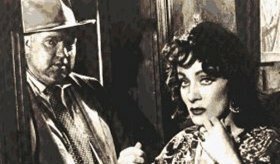
|
| |
| |
|
|
| Tookey's Review |
|
| Pro Reviews |
|
| Mixed Reviews |
|
| Anti Reviews |
|
| Cast |
|
| |
 |
| |
| Released: |
1958 |
| |
|
| Genre: |
THRILLER
PANNED
|
| |
|
| Origin: |
US |
| |
|
| Colour: |
BW |
| |
|
| Length: |
114 |
|
| |
|
| |
|
|
| |
|
|
In a Mexican border town, a narcotics investigator (Charlton Heston) on honeymoon with his wife (Janet Leigh) confronts a corrupt police chief (Orson Welles) over a murder.
|
Reviewed by Chris Tookey
|
|
Orson Welles's thriller was panned on release, but has gradually won a reputation as a masterpiece. It is strong on noir atmosphere, and Russell Metty's camerawork is excellent. The three-minute opening shot is a classic, both in terms of technique and the way it engineers suspense.
The film as a whole has become hugely overrated. Charlton Heston is totally unbelievable as a Mexican, and Janet Leigh struggles with a script that requires her to act brainlessly throughout). There is little that's credible either in the crude way Heston's adversary, a corrupt police chief (Orson Welles), frames a suspect for murder, or pursues Heston with unbridled bigotry and incompetence.
The 1999 version, corresponding more to Welles's original intentions before the studio recut it without his permission, doesn't get round those problems. More clarity in the story-telling would have helped. And, seeing if for the first time in twenty years, I was struck for the first time by the poor quality of the acting, which ranges from the wooden (Marlene Dietrich as a madam is even less animated than Heston) to the demented (Dennis Weaver gurns horribly as a motel-owner Anthony Psycho Perkins would cross the road to avoid).
Seldom has so much pictorial artistry been applied to so sloppy a screenplay. There will be no shortage of Welles-worshippers to hail this as a masterpiece; but the truth is that even great directors can make seriously flawed films, and this is one of them.
|
|
"Touch of Evil never had a first-run, never had the usual presentation to the press and was not the object of any critical writing in either the weeklies, the reviews or the daily papers. It was considered to be too bad."
|
|
| (Orson Welles) |
|
|
|
|
|
|
|
